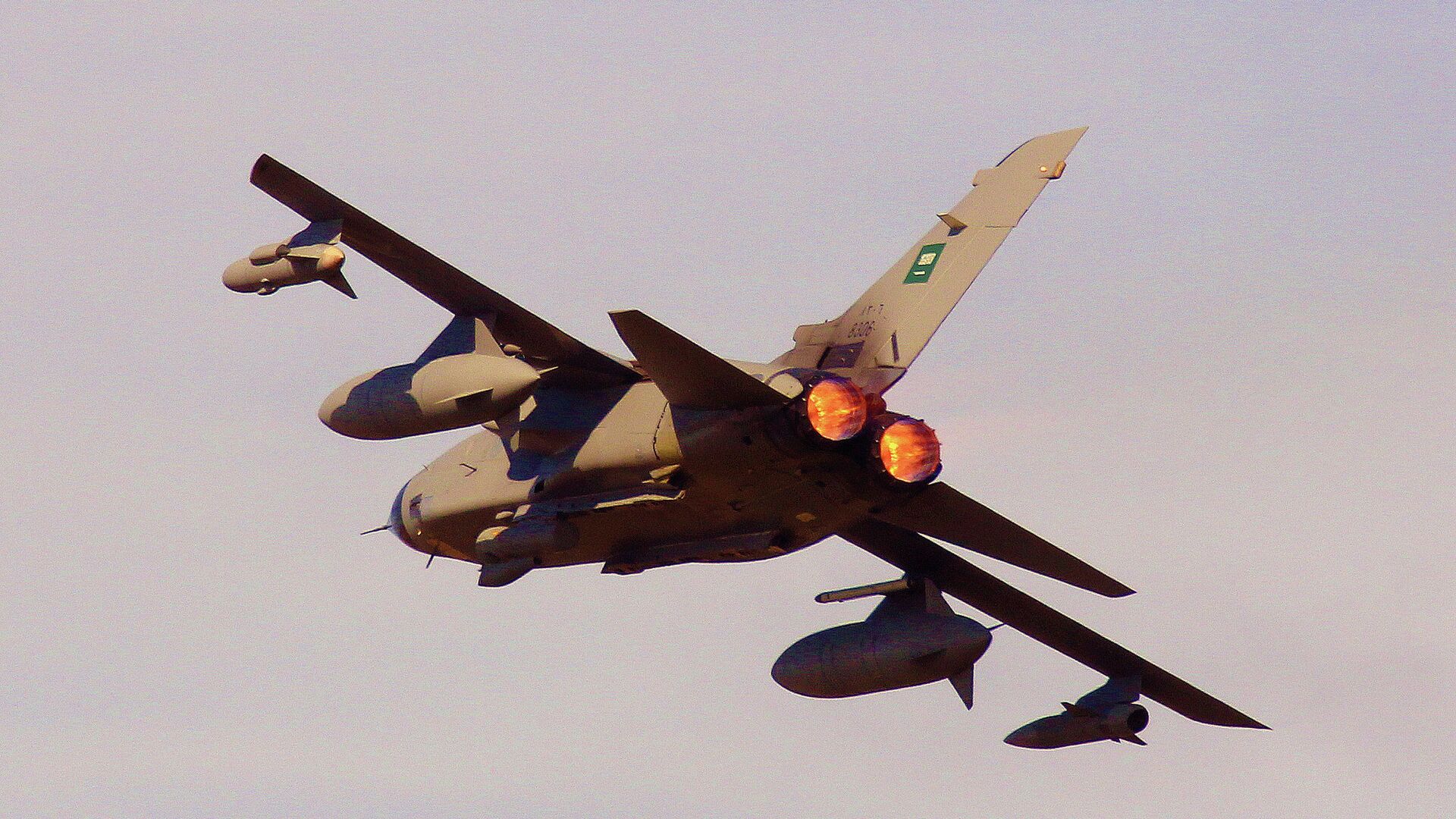https://sputnikglobe.com/20211220/saudi-royal-air-force-launching-specific-and-precise-strikes-on-yemens-sanaa-airport---coalition-1091676706.html
Saudi Royal Air Force Launching 'Specific and Precise' Strikes on Yemen's Sana'a Airport - Coalition
Saudi Royal Air Force Launching 'Specific and Precise' Strikes on Yemen's Sana'a Airport - Coalition
Sputnik International
The strikes came shortly after a warning was issued by the Saudi government for civilian organizations to evacuate the main airport in Sana'a, the Houthi-controlled capital of Yemen.
2021-12-20T19:13+0000
2021-12-20T19:13+0000
2021-12-20T20:00+0000
saudi arabia
yemen
houthis
airport
airstrikes
https://cdn1.img.sputnikglobe.com/img/102015/68/1020156831_0:108:2049:1260_1920x0_80_0_0_f8586e92af278e6e614ed2ca125d260c.jpg
The Saudi-led coalition announced Monday evening it was carrying out "precise and specific" airstrikes on Houthi targets at Yemen's Sana'a airport "in accordance with international and humanitarian law."Photos posted on social media claimed to show the intensity of the bombardment.However, journalist Shuaib M. Almosawa, who is located in Sana'a, noted that the language of the Saudi statement implied it struck the airport's tarmac, which would make it unsuitable for accepting humanitarian aid shipments being flown in by the United Nations.The strikes came after the Saudis claimed to have shot down a Houthi drone targeting King Abdullah Airport in the southern Saudi city of Jazan, where Saudi air forces are located. The coalition said it was targeting drone-related facilities in Sana'a, including a factory, storage sites, and a launch facility.Earlier this month, the Houthis boasted government forces in the city of Ma'rib would collapse within days of their capture of Jabal al-Balaq al-Awsat mountain, but with control over the massif still unclear, the regional capital remains split.The war has raged since March 2015, when Hadi was forced from the country and fled to Riyadh, which rallied several other Sunni Arab states and launched a massive blockade and bombing campaign that has crippled Yemen's infrastructure, creating what the UN has described as the "world's worst humanitarian crisis." UN estimates from late November say 377,000 Yemenis have been killed in the war, the majority of whom have died due to noncombat effects of the war, including hunger, diseases like cholera and COVID-19, and lack of access to medical care or clean water.The Zaidi Shiite Houthis, who hail from the country's north, came to power at the head of a protest movement against reforms by Hadi that raised gas prices and would have amplified already-existing poverty in the country instead of eliminating it. The Saudis and US have claimed they are supported by Iran, although both groups have denied the claims and little evidence has been produced to support them.
saudi arabia
yemen
Sputnik International
feedback@sputniknews.com
+74956456601
MIA „Rossiya Segodnya“
2021
News
en_EN
Sputnik International
feedback@sputniknews.com
+74956456601
MIA „Rossiya Segodnya“
Sputnik International
feedback@sputniknews.com
+74956456601
MIA „Rossiya Segodnya“
sanaa, yemen; saudi; airstrikes; houthis
sanaa, yemen; saudi; airstrikes; houthis
Saudi Royal Air Force Launching 'Specific and Precise' Strikes on Yemen's Sana'a Airport - Coalition
19:13 GMT 20.12.2021 (Updated: 20:00 GMT 20.12.2021) The strikes came shortly after a warning was issued by the Saudi government for civilian organizations to evacuate the main airport in Sana'a, the Houthi-controlled capital of Yemen.
The Saudi-led coalition announced Monday evening it was carrying out "precise and specific" airstrikes on Houthi targets at Yemen's Sana'a airport "in accordance with international and humanitarian law."
Photos posted on social media claimed to show the intensity of the bombardment.
However, journalist
Shuaib M. Almosawa, who is located in Sana'a, noted that the language of the Saudi statement implied it struck the airport's tarmac, which would make it unsuitable for accepting humanitarian aid shipments being flown in by the United Nations.
The strikes came after the
Saudis claimed to have shot down a Houthi drone targeting King Abdullah Airport in the southern Saudi city of Jazan, where Saudi air forces are located. The coalition said it was targeting drone-related facilities in Sana'a, including a factory, storage sites, and a launch facility.
They also come as the Saudi-led anti-Houthi coalition, which includes Yemeni forces loyal to President Abdrabbuh Mansour Hadi, loses its grip in Ma'rib Governorate. The oil-rich province is Hadi's last stronghold in the north, and the Saudi Royal Air Force has waged a
fierce bombing campaign to blunt the Houthi offensive.
Earlier this month,
the Houthis boasted government forces in the city of Ma'rib would collapse within days of their capture of Jabal al-Balaq al-Awsat mountain, but with control over the massif still unclear, the regional capital remains split.
According to a
November 20 estimate by Muammar Al-Eryani, the Houthi information minister, 15,000 Houthi fighters have fallen in Ma’rib since March, when
the drive on Ma'rib began to get bogged down.
The war has raged since March 2015, when Hadi was forced from the country and fled to Riyadh, which rallied several other Sunni Arab states and launched a massive blockade and bombing campaign that has crippled Yemen's infrastructure, creating what the
UN has described as the "world's worst humanitarian crisis." UN estimates from late November
say 377,000 Yemenis have been killed in the war, the majority of whom have died due to noncombat effects of the war, including hunger, diseases like cholera and COVID-19, and lack of access to medical care or clean water.
The Zaidi Shiite Houthis, who hail from the country's north, came to power at the head of a protest movement against reforms by Hadi that raised gas prices and would have amplified already-existing poverty in the country instead of eliminating it. The Saudis and US have claimed they are supported by Iran, although both groups have denied the claims and little evidence has been produced to support them.

